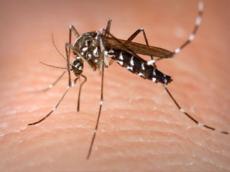|
|
TODAY.AZ / Weird / Interesting
New cloak hides man from mosquito sight
12 September 2013 [10:56] - TODAY.AZ
 In an advance toward providing mosquito-plagued people, pets and livestock with an invisibility cloak against these blood-sucking insects, scientists today described discovery of substances that occur naturally on human skin and block mosquitoes' ability to smell and target their victims.
In an advance toward providing mosquito-plagued people, pets and livestock with an invisibility cloak against these blood-sucking insects, scientists today described discovery of substances that occur naturally on human skin and block mosquitoes' ability to smell and target their victims.The presentation was among almost 7,000 scheduled here this week at the 246th National Meeting & Exposition of the American Chemical Society, the world's largest scientific society. Thousands of scientists and others are expected to attend the sessions, being held in the Indiana Convention Center and downtown hotels.
Ulrich Bernier, Ph.D., who gave the talk, cited the pressing need for better ways to combat mosquitoes. Far from being just a nuisance, mosquitoes are more deadly to humans than any other animal. Their bites transmit malaria and other diseases that kill an estimated one million people around the world each year. In the United States, mosquitoes spread rare types of encephalitis, an inflammation of the brain. They also transmit heart worms to pet dogs and cats.
Female mosquitoes, which suck blood to obtain a protein needed to produce fertile eggs, can smell people from over 100 feet away. The Mosquito and Fly Unit at the A person's scent, Bernier explained, comes from hundreds of compounds on the skin, many emitted through sweat and others produced by bacteria. To identify which of these attract mosquitoes, Bernier and colleagues used a special mosquito cage divided by a screen. They sprayed various substances into one side of the cage, and documented the effects in attracting mosquitoes.
Some compounds, like lactic acid—a common component of human sweat—were definite mosquito lures, drawing 90 percent of the mosquitoes to the screen. With other compounds, however, many of the mosquitoes didn't even take flight or seemed confused.
/AzerTAg/
URL: http://www.today.az/news/interesting/126156.html
 Print version
Print version
Views: 1638
Connect with us. Get latest news and updates.
See Also
- 05 February 2025 [19:41]
Japan plans to negotiate with Trump to increase LNG imports from United States - 23 January 2025 [23:20]
Dubai once again named cleanest city in the world - 06 December 2024 [22:20]
Are scented candles harmful to health? - 23 November 2024 [14:11]
Magnitude 4.5 earthquake hits Azerbaijan's Lachin - 20 November 2024 [23:30]
Launch vehicle with prototype of Starship made its sixth test flight - 27 October 2024 [09:00]
Fuel prices expected to rise in Sweden - 24 October 2024 [19:14]
Turkiye strikes terror targets in Iraq and Syria - 23 October 2024 [23:46]
Kazakhstan supplied almost entire volume of oil planned for 2024 to Germany in 9 months - 23 October 2024 [22:17]
Taiwan reported passage of Chinese Navy aircraft carrier near island - 23 October 2024 [21:50]
Russia remains largest oil supplier to India
Most Popular
 Mono-Armenia what tales did Pashinyan tell in Washington
Mono-Armenia what tales did Pashinyan tell in Washington
 Pashinyan signed up for a ChatGPT course
Pashinyan signed up for a ChatGPT course
 Turkiye’s President Erdo?an approves migration cooperation agreement with Azerbaijan
Turkiye’s President Erdo?an approves migration cooperation agreement with Azerbaijan
 Azerbaijan’s fire safety service reviews 2024 successes and prepares for 2025
Azerbaijan’s fire safety service reviews 2024 successes and prepares for 2025
 Azerbaijan bans entry of Russian MP over offensive remarks
Azerbaijan bans entry of Russian MP over offensive remarks
 Chamber and Organ Music Hall to hold series of concerts
Chamber and Organ Music Hall to hold series of concerts
 Azerbaijan’s Consulate in Los Angeles reopens after wildfires
Azerbaijan’s Consulate in Los Angeles reopens after wildfires
